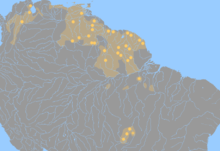Kuikuro language
| Kuikuro | |
|---|---|
| Region | Mato Grosso, central Brazil |
| Ethnicity | Kuikuro people |
|
Je–Tupi–Carib?
|
|
| Language codes | |
| ISO 639-3 | – |
| Glottolog | kuik1245 |

Upper Xingu languages are the southernmost branch of Cariban languages
|
|
Kuikuro or Kuikuroan is a dialect of the Upper Xingu Language spoken by the Kuikuro people. The Kuikuro are a group of Indigenous people living in Mato Grosso, Brazil. The Upper Xingu Language is part of the Southern branch of the Cariban language family. Although bilingualism in Brazilian Portuguese is prevalent among the men of the community, Kuikuro is not as immediately endangered as many of Brazilian Indigenous languages. As of 2006, there are an estimated 1,106 native speakers of Kuikuro worldwide, yielding the language a "Threatened" classification by The Endangered Languages Project. In collaboration with linguist Bruna Franchetto, the Kuikuro have created a library of recordings that feature Kuikuro stories in the language that is archived at the Archive of the Indigenous Languages of Latin America
Vowels
Consonants
Kuikuro is a dialect of the Upper Xingu Carib Language, which is a member of the Southern branch of the Carib family. Like most of the Carib family, Kuikuro is an agglutinative language with a highly complex morphology that effects both verbs and nouns. It is head-final and dependent marking. Its case system is ergative. A sample sentence shows the S/O V structure, the morphological richness, and the ergativity of Kuikuro:
katsogo-ko heke kangamuke-ko kagine-nügü dog-PL ERG child-PL frighten-PNCT ‘(the) dogs frightened (the) children’
Kuikuro nouns can occur bare, with both number and definiteness being unmarked. Like many other neutral number languages (Korean, for example) there is a morpheme which - when affixed to a noun - denotes it as plural and marked. In Kuikuro this is the morpheme /-ko/. The following is demonstrative of one of the morpheme’s regular usages.
It is important to note here that the morpheme /-ko/ is only used on nouns that are [+animate] as in (2) but not (3).
...
Wikipedia
